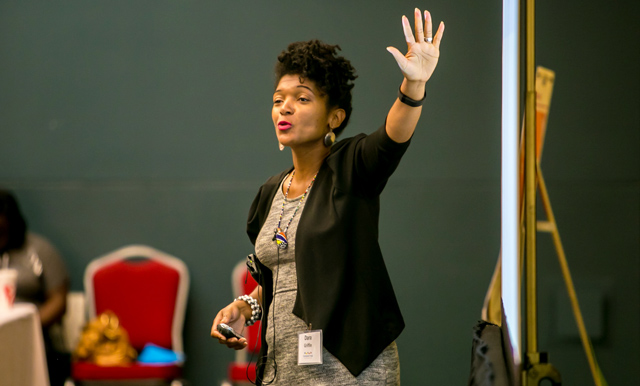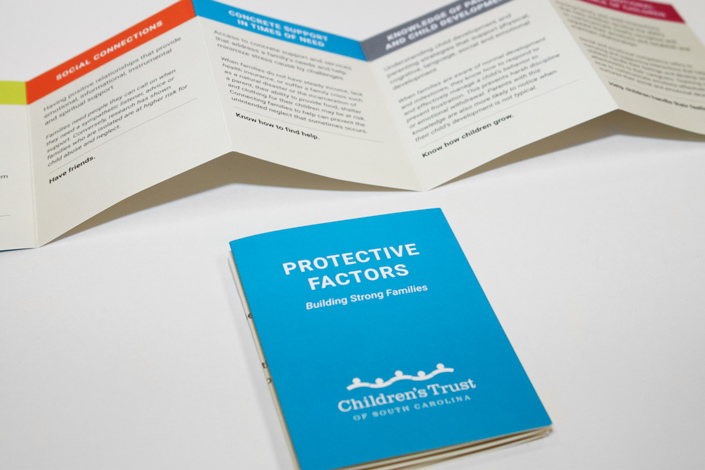Looking for good conversations about the the ups and down of raising children and building a cohesive family? The place to go is a Parent Café. Neil White, who tells the stories of Children’s Trust, attended a recent training session that our organization held for those interested in bringing the Parent Café to their communities.
The ingredients for a good café are simple. It should be warm and inviting. It should foster fellowship. It should encourage expressive conversations from the casual to the serious.
That’s the goal for the Parent Café.
Developed by Illinois-based Be Strong Families, the Parent Café brings parents together for structured conversations about the challenges and rewards of raising children. By encouraging meaningful and reflective dialogue, these conversations incorporate the protective factors and promote peer-to-peer learning. Protective factors help families thrive as well as reduce the incidence and consequences of child abuse and neglect.
Children’s Trust recently presented a two-day workshop to train individuals on how to bring the Parent Cafe to their communities. The workshop detailed the essential elements for hosting a café, which include small tables of three to five people, a table host, and agreements that participants must follow. A café generally will have 12 to 20 total participants.
Dara Griffin, the executive vice president for family and community engagement at Be Strong Families, helped guide the workshop in Columbia and is an enthusiastic teacher on the benefits of the model.

Dara Griffin discusses the protective factors at the Children’s Trust Prevention Conference in 2015.
“All families need the protective factors. All families need healing. All families could stand to be strengthened,” Griffin said. “And it cuts across all the divisions — race, economic bracketing, social status. Every parent that I know struggles in some area with their family or their kids. This is about all parents working together to strengthen each other.”
Birley Wright, the prevention training manager for Children’s Trust, values the Parent Café process because it starts with the strengths of each unique family and builds on that foundation.
“The response to the Parent Café work over the last few years has been extremely positive,” Wright said. “For those who have experienced one, the conclusion is that most often parents leave feeling more hopeful, supported and confident in their parenting.”
Griffin emphasizes the foundational importance of the protective factors — they are crucial in the lives of every family if it’s going to be strong.
“It doesn’t matter who I am. If I’m a parent, I need to be resilient,” Griffin said. “I need to have friends. I need to know about concrete resources in my community if things happen that I don’t expect. I need to know how my child is supposed to develop and what healthy development looks like. I have to understand the way I communicate with my kids is how they’ll communicate with me.”
Christine Smith, the director of prevention and outreach at Hope Haven of the Lowcountry, went through the workshop. She especially likes how participants are free to open up honestly about their family lives. The discussion agreements include no passing judgment on what people say.
“It’s about parents coming together and sharing experiences. That’s really refreshing,” Smith said.
She also appreciates how the model allows her to take take off her own professional hat when hosting and share her personal struggles and rewards as a parent.
Sarita Sashington, the parent engagement manager at Be Strong Families who also helped run the sessions, likes to hear that. She wants people being trained to understand more than simply how to implement the Parent Café. She wants them to include their own parenting experiences.
“They, too, were once in a place where they were vulnerable,” Sashington said. “I want them to be empathetic to the parents they’re working with and to see the parents as experts in their own homes.”

All families need protective factors in keeping them strong.
Rosa Gonzalez, the lead social worker in the Greenville County schools, also attended the workshop. As someone who also works in private practice with Spanish-speaking families who have experienced trauma such as sexual abuse, child abuse, and domestic violence, she knows the value of Parent Café.
“When families or parents or mothers see they’re not an isolated case and can get together with other parents or women who are experiencing similar things and share open and honest discussion, they learn, engage and connect,” Gonzalez said. “They’ll build relationships that can help them outside of the Parent Café and find resources that they may need in the community.”
Parent Café has been implemented in half of the states nationally as well as Guam and the Philippines. The partnerships built with organizations like Children’s Trust, which has offered this training for two years, have enhanced the lives of parents across the country.
“We are here to be of service to each other,” Griffin said. “We have a stake in all families being healthy and well. There’s a lot of healing power in groups of people coming together and sharing their experiences in an authentic way. That’s really what the Parent Café is.”




